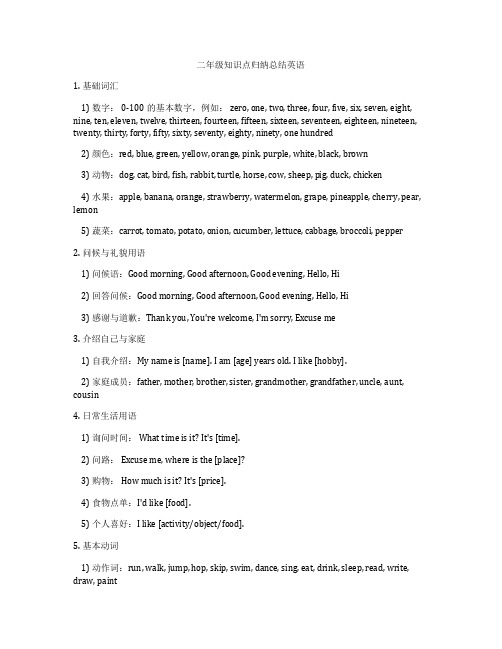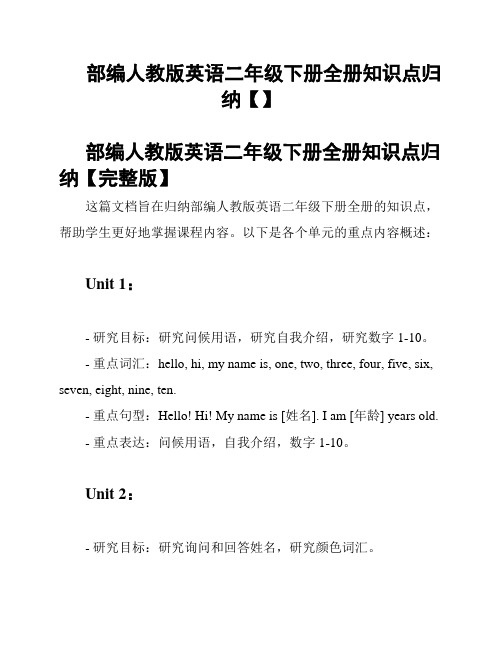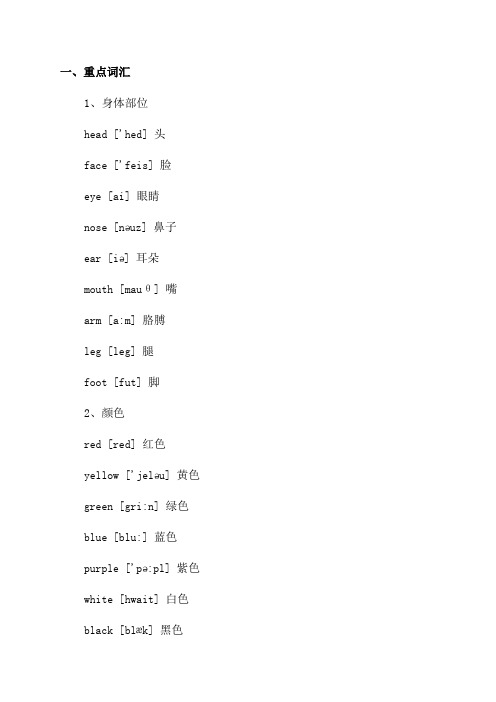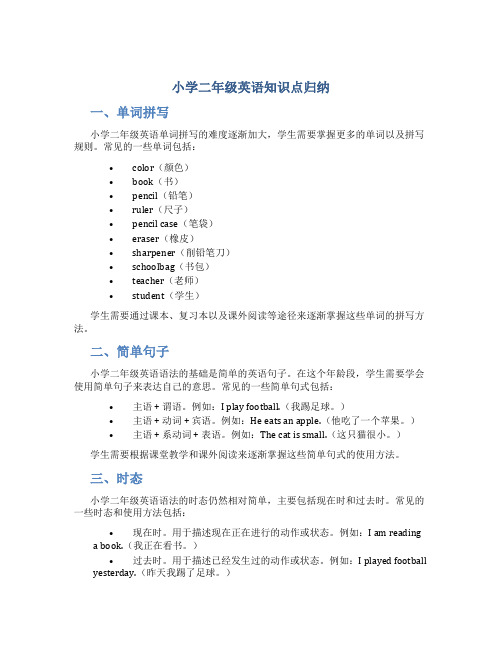二年级英语知识点重点归纳整理.doc
二年级知识点归纳总结英语

二年级知识点归纳总结英语1. 基础词汇1) 数字: 0-100的基本数字,例如: zero, one, two, three, four, five, six, seven, eight, nine, ten, eleven, twelve, thirteen, fourteen, fifteen, sixteen, seventeen, eighteen, nineteen, twenty, thirty, forty, fifty, sixty, seventy, eighty, ninety, one hundred2) 颜色:red, blue, green, yellow, orange, pink, purple, white, black, brown3) 动物:dog, cat, bird, fish, rabbit, turtle, horse, cow, sheep, pig, duck, chicken4) 水果:apple, banana, orange, strawberry, watermelon, grape, pineapple, cherry, pear, lemon5) 蔬菜:carrot, tomato, potato, onion, cucumber, lettuce, cabbage, broccoli, pepper 2. 问候与礼貌用语1) 问候语:Good morning, Good afternoon, Good evening, Hello, Hi2) 回答问候:Good morning, Good afternoon, Good evening, Hello, Hi3) 感谢与道歉:Thank you, You're welcome, I'm sorry, Excuse me3. 介绍自己与家庭1) 自我介绍:My name is [name]. I am [age] years old. I like [hobby].2) 家庭成员:father, mother, brother, sister, grandmother, grandfather, uncle, aunt, cousin4. 日常生活用语1) 询问时间: What time is it? It's [time].2) 问路: Excuse me, where is the [place]?3) 购物: How much is it? It's [price].4) 食物点单:I'd like [food].5) 个人喜好:I like [activity/object/food].5. 基本动词1) 动作词:run, walk, jump, hop, skip, swim, dance, sing, eat, drink, sleep, read, write, draw, paint2) 状态词:is, am, are, was, were, have, has, had, do, does, did, can, could, will, would, shall, should, may, might, must6. 形容词1) 外貌形容词:big, small, tall, short, fat, thin, old, young, long, short, happy, sad, angry2) 颜色形容词:red, blue, green, yellow, orange, pink, purple, white, black, brown3) 比较级与最高级:bigger, smaller, taller, shorter, fatter, thinner, older, younger4) 形容词性物主代词:my, your, his, her, its, our, their7. 基本句型1) 主语+谓语:I am a student.2) 主语+谓语+宾语:I eat an apple.3) 主语+谓语+宾语+宾补:I drink water.4) 主语+谓语+间接宾语+直接宾语:She gives me a book.5) 主系表结构:I am happy.6) 祈使句:Sit down. Stand up. Open the door. Close the window.7) 疑问句:Is she a doctor? Do you like apples? Can she swim?8. 常见的动词短语1) 清理房间:clean up the room, make the bed, sweep the floor, mop the floor, do the dishes, take out the trash2) 生活起居:get up, go to bed, brush teeth, wash face, comb hair, take a shower, have breakfast/lunch/dinner3) 衣着穿戴:put on clothes, take off clothes, wear a hat, wear a coat, wear shoes, tie shoelaces4) 学习活动:study hard, do homework, read a book, write a letter, draw a picture, painta picture, listen to music9. 常用的介词1) 时间介词:on, in, at, for, since2) 地点介词:in, on, at, under, over, between, next to, near, far from3) 方向介词:to, from, into, out of, up, down, forward, backward10. 日常活动1) 上学生活:go to school, have classes, do homework, play games, have lunch, have a break, go home2) 平时活动:play, read, draw, watch TV, listen to music, swim, run, walk, skip, jump, hop3) 家庭生活:help parents, set the table, clear the table, clean the room, water the plants, take care of pets总结:二年级的英语知识主要包括基础词汇、问候与礼貌用语、介绍自己与家庭、日常生活用语、基本动词、形容词、基本句型、常见的动词短语、常用的介词以及日常活动等内容。
部编人教版英语二年级下册全册知识点归纳【】

部编人教版英语二年级下册全册知识点归纳【】部编人教版英语二年级下册全册知识点归纳【完整版】这篇文档旨在归纳部编人教版英语二年级下册全册的知识点,帮助学生更好地掌握课程内容。
以下是各个单元的重点内容概述:Unit 1:- 研究目标:研究问候用语,研究自我介绍,研究数字1-10。
- 重点词汇:hello, hi, my name is, one, two, three, four, five, six, seven, eight, nine, ten.- 重点句型:Hello! Hi! My name is [姓名]. I am [年龄] years old.- 重点表达:问候用语,自我介绍,数字1-10。
Unit 2:- 研究目标:研究询问和回答姓名,研究颜色词汇。
- 重点词汇:What's your name? My name is..., color words (red, blue, yellow, green, orange, purple, black, white).- 重点句型:What's your name? My name is... What color is it? It's...- 重点表达:询问姓名,回答姓名,颜色词汇。
Unit 3:- 研究目标:研究询问和回答年龄,研究数字11-20。
- 重点词汇:How old are you? I am [年龄] years old, numbers 11-20.- 重点句型:How old are you? I am... years old. How many candles? Eleven, twelve, thirteen, fourteen, fifteen, sixteen, seventeen, eighteen, nineteen, twenty.- 重点表达:询问年龄,回答年龄,数字11-20。
二年级英语重要知识点整理

一、重点词汇1、身体部位head ['hed] 头face ['feis] 脸eye [ai] 眼睛nose [nəuz] 鼻子ear [iə] 耳朵mouth [mauθ] 嘴arm [a:m] 胳膊leg [leg] 腿foot [fut] 脚2、颜色red [red] 红色yellow ['jeləu] 黄色green [gri:n] 绿色blue [blu:] 蓝色purple ['pə:pl] 紫色white [hwait] 白色black [blæk] 黑色3、动物cat [kæt] 猫dog [dɔg] 狗pig [pig] 猪duck [dʌk] 鸭子monkey ['mʌŋki] 猴子snake [sneik] 蛇goose [gu:s] 鹅elephant ['elifənt] 大象4、水果apple ['æpəl] 苹果orange [ɔrindʒ] 橙子banana ['bænənə] 香蕉pear [pεə] 梨watermelon ['wɔ:təmelən] 西瓜strawberry ['strɔ:bəri] 草莓grape [greip] 葡萄cherry ['tʃerri] 樱桃5、衣服shirt [ʃə:t] 衬衫dress [dres] 连衣裙jacket ['dʒækit] 夹克pants [pænts] 裤子skirt [skə:t] 短裙socks [sɔks] 袜子shorts [ʃɔ:ts] 短裤6、星期Monday ['mʌndeɪ] 星期一Tuesday ['tju:zdeɪ] 星期二Wednesday ['wenzdeɪ] 星期三Thursday ['θə:zdeɪ] 星期四Friday ['fraidi] 星期五Saturday ['sætədeɪ] 星期六Sunday ['sʌndeɪ] 星期日7、食物rice [rais] 米饭noodle ['nu:dl] 面条bread [bred] 面包soup [su:p] 汤egg [eg] 鸡蛋meat [mi:t] 肉milk [milk] 牛奶fish [fiʃ] 鱼8、日常用品pen [pen] 钢笔eraser [i'reizə] 橡皮book [buk] 书pencil ['pensəl] 铅笔bag [bæg] 书包ruler ['ru:lə] 尺子二、重点句型1、What's this? 这是什么?2、It'sa…它是一个…3、It's an… 它是一个…。
英语二年级知识点汇总

英语二年级知识点汇总Module 1 知识点归类U1What can you see?基础知识:★背默单词:white, purple, pink, orange, brown, black, red, green, blue, yellow, colour, butterfly, butterflies,★复习单词:apple,bag, cat, dog, elephant, five, girl, hand, insect, jar, kite, lion, mouse, net, orange, pig, queen, rabbit, soup, table, umbrella, van, window, box, zebra★认读单词:rainbow,beautiful,shining, over there, outside my window,★句型:What can you see? I can see a bird.What colour is it? I t’s blue.What can you see? I can two butterflies.What colour are they? They are purple and yellow.简单的语法:词法:★orange可以作为颜色,也可以作为水果。
如:This is an orange. (这是一个橘子),又如:I like orange. (我喜欢橘色)。
现在请你判断一下:Do you like orange? Do you like oranges?有什么不同呢?对了,第一句是:你喜欢橘色吗?第二句:你喜欢橘子吗?名词单数要加a,an,而复数加s。
★本单元中学到一些单词词首发元音:an orange, an insect, an elephant, an umbrella, an apple ★insect是昆虫的总称。
(完整word版)上海牛津二年级上英语知识点总复习

2A英语期末复习知识点班级 ____________ 姓名____________________ 学号_____________一、单词:(请家长在家督促孩子自默,必会单词必须过关,加星单词尽量能背出,默写出)Modulel:必会单词:morning, after noon, eve ning, ni ght, boy, girl, big, small, seve n, eight, nine, ten, apple, bag, cat, dog, elepha nt加星单词: one, two, three, four, five, six, snake, goodbye, hello, hi, how, who, what, tall, short, fat, thi n, he, she, it, I , you, like, can, cant, tha nks, good, ni ce. Module2:必会单词:run, write, swim, fly, young, old, sister, brother, hair, head, face, girl, han d, , jar, kite, li on加星单词: draw, sing, dance, ride, skip, read, but, super, Giant, gate, fathere, mother, gran dfather, gran dmother, h', shes, is n't, friend, family, eye, mouth, ear,no se, big, small, am, is, are, my, your,i nsect, SupergirlModule3:必会单词:slide, swing, seesaw, bag, box, desk, chair, bowl, plate, spo on, chopsticks, mouse, net, pig, rabbit, in, on, see加星单词: garden, flower, tree, grass, colour, red, green, yellow, blue, brown, pink, purple, white, black, grey, mice, bee, they, you, room, pen, pencil, rubber,ruler, pencil case, table, under, how many, there is, there are, dinner, floor,room,ora nge, quee nModule4:必会单词:sky, sun, moon, star, fox, hippo, meat, grass, flower, tree, soup, table, box, yellow加星单词:bright, rain, cloud, look at, ro un d, a ni mal, farm, forest, mon key, li on, tiger, rabbit, cow, sheep, cute, nice, hop, swing, naughty, banana, draw, colour,cut, help, zoo, bee, cry, umbrella, van, win dow, , zebra、句型:(在家熟读,问句和答句都必须熟练掌握,并能快速反应)Modulel:1. Good morni ng. Good morni ng.2. Good after noon. Good after noon.3. Good eve ning. Good eve ning.4. Good ni ght. Good night.5. Goodbye. Goodbye6. Hello! Hello! (Hi !)7. How are you? I ' m fine. Thank you. (I ') m very well.8. I ' na girl(boy). I s hmrt. I ' m thin.You' re a girl(boy). You ' re taHeYcfat. '9. Are you Alice? Yes, I ' m. ( No, I KittymAre you a girl(boy)? Yes.( No.)Are you tall? Yes.( No.)Module2:1. Can you write(run,draw,fly --Y)es, I can.(No, I can ' t)2. Who ' sshe? She' s Sally.Is she your sister? Yes, she is.(No, she isn ' t)Is he a boy? Yes, he is.(No, he isn ' t)3. My(Your) head is….My(Your) hair i s….My(Your) nose is…My(Your) eyes are… .My (Your)ears are… My(Your) hands are… Module3:1. What can you see? I can se …What colour is it? It ' What colour are they? They are•…2. Put the pencil in the pencil case . OK.( Yes.) (All right.)Put the book on the desk. OK.( Yes.) (All right.)Put the bag un der the box. OK.( Yes.) (All right.)3. How many bowls? There are two bowls.How many spo ons? There is one.A spoon? Yes, please. ( No, thanks.)4. Give me a plate , please. Here you are.5. Dinner is ready! I'm coming.Module4:1. Look at the sky. Can you see the moonYes, I ca n.( No, I ca n) 't It s big.It's bright.2. Look at the lion. It's big. It likes meat.Look at the mon key. It's small. It likes banan as.Look at the hippo'smouth. Wow! It's so big.3. Don't pick the flowers. I ' m sy.Don't climb the tree. I ' m sorry.Don't ride a bicycle in the street. I ' m sorry.Don' t play in the street. I ' m sorry.Don' t draw on the wall. I ' m sorry.三、其他知识点:(必须掌握)1. Thank you. You are welcome.(That' s all right.2. I'm sorry. It'sOK.(That ' s all right.3. May I have some water? Here you are.4. Give me a plate, please. Here you are.5. A spoon? Yes, please.6. Chopsticks? No, thanks.7. Have some juice. Thank you.8. 介词短语要掌握:in the bowl , in the forest, i n the skyon the plate, on the farm, on the floor9. 元音字母开头的单词,前面加“ an”例:an apple, an oran ge, an egg, an elepha nt, an umbrella, an ice crea an in sect 10. 世界上唯一的东西,前面冠词用“ the”the moon, the sun, the sky11. am, is, are的用法及缩写形式I am = I'myou are = you're they are = they' rehe is = hes she is = shes it is = it s单数后面用is The |cat i* on the desk.复数名词后面用are The |cats arg on the desk.12. can'(不会)do n'(不要)isnt'(不是)13. (名字及特殊名词开头要大写)Mr, Miss, Mrs, Gia nt. Supergirl, Kitty, Da nny …14. I am a boy. It's a mo nkey.(单数的时候不要漏掉a )I like apple*. It likes banana s (复数名词不要漏掉加s )特殊的名词复数要牢记:mouse— mice fox —foxes box—boxes15. It like s meat. It like s grass. (s 不要漏掉)16. 特殊疑问句:开头有特殊疑问词,女口How, What, Who, What colour等,为特殊疑问句。
小学二年级英语知识点归纳

小学二年级英语知识点归纳一、名词(Nouns)名词是指人、物、地方或抽象的东西,是英语中最基本的词汇之一。
在小学二年级英语学习中,学生需要掌握以下常见的名词:1. 人类(Names of People)•teacher(老师)•student(学生)•friend(朋友)•mother(母亲)•father(父亲)•brother(兄弟)•sister(姐妹)2. 动物(Names of Animals)•cat(猫)•dog(狗)•panda(熊猫)•elephant(象)•giraffe(长颈鹿)•monkey(猴子)3. 物品(Names of Objects)•car(汽车)•bike(自行车)•book(书)•pencil(铅笔)•ball(球)•toy(玩具)4. 地方(Names of Places)•school(学校)•park(公园)•beach(海滩)•zoo(动物园)•market(市场)•restaurant(饭店)二、代词(Pronouns)代词是指一个人或物品的名字,可以用来代替其他名称或物品。
在小学二年级英语学习中,学生需要掌握一些常见的代词:•I(我)•you(你)•he(他)•she(她)•it(它)•we(我们)•they(他们)三、动词(Verbs)动词是指一种体现行动或状态的词。
在小学二年级英语学习中,学生需要掌握以下动词:•play(玩)•read(读)•sing(唱)•dance(跳舞)•run(跑)•walk(走)四、形容词(Adjectives)形容词是指用来描述或定义名词的词语。
在小学二年级英语学习中,学生需要掌握以下形容词:•big(大)•small(小)•happy(快乐的)•sad(难过的)•funny(有趣的)•pretty(漂亮的)五、副词(Adverbs)副词是指用来修饰动词、形容词和其他副词的词语。
在小学二年级英语学习中,学生需要掌握以下副词:•quickly(快速地)•slowly(慢慢地)•happily(高兴地)•sadly(悲伤地)•very(非常地)•too(太)六、数词(Numers)数词是指用来表示数量的词。
小学二年级英语知识点

1.基本的问候语和礼貌用语:- Hello! 你好!- Good morning/afternoon/evening! 早上/下午/晚上好!- How are you? 你好吗?- Nice to meet you! 很高兴认识你!- Thank you! 谢谢!2.数字和计数:-数字1-100的基本表达-数字的读法和写法-问询、回答年龄的句型3.基本的日常生活用语:- What's your name? 你叫什么名字?- How old are you? 你几岁了?- Where do you live? 你住在哪里?- What's your favorite color/animal/food? 你最喜欢的颜色/动物/食物是什么?4.常见的动词:- be 动词的基本用法:am, is, are- have 拥有;使用的基本用法5.基本的形容词:- 形容词的基本用法:big, small, tall, short, happy, sad, nice, mean等6.基本的名词:- 主要的物体名称:ball, car, cat, dog, apple, book, pencil 等- 人称代词:I, you, he, she, it, we, they7.基本的人称代词:- 主格:I, you, he, she, it, we, they- 宾格:me, you, him, her, it, us, them8.基本的地点介词:- in, on, under, behind, in front of, beside等的基本用法9.基本的动物和颜色:- 基本的动物名称:dog, cat, bird, fish, rabbit等- 基本的颜色名称:red, blue, yellow, green, black, white等10.日常生活中基本的句型和表达:- What do you like to do? 你喜欢做什么?- Where is the park/school/store? 公园/学校/商店在哪里?- Can I have...? 我可以要...吗?-I don't know. 我不知道。
小学二年级英语知识点归纳

小学二年级英语知识点归纳一、单词拼写小学二年级英语单词拼写的难度逐渐加大,学生需要掌握更多的单词以及拼写规则。
常见的一些单词包括:•color(颜色)•book(书)•pencil(铅笔)•ruler(尺子)•pencil case(笔袋)•eraser(橡皮)•sharpener(削铅笔刀)•schoolbag(书包)•teacher(老师)•student(学生)学生需要通过课本、复习本以及课外阅读等途径来逐渐掌握这些单词的拼写方法。
二、简单句子小学二年级英语语法的基础是简单的英语句子。
在这个年龄段,学生需要学会使用简单句子来表达自己的意思。
常见的一些简单句式包括:•主语 + 谓语。
例如:I play football.(我踢足球。
)•主语 + 动词 + 宾语。
例如:He eats an apple.(他吃了一个苹果。
)•主语 + 系动词 + 表语。
例如:The cat is small.(这只猫很小。
)学生需要根据课堂教学和课外阅读来逐渐掌握这些简单句式的使用方法。
三、时态小学二年级英语语法的时态仍然相对简单,主要包括现在时和过去时。
常见的一些时态和使用方法包括:•现在时。
用于描述现在正在进行的动作或状态。
例如:I am readinga book.(我正在看书。
)•过去时。
用于描述已经发生过的动作或状态。
例如:I played football yesterday.(昨天我踢了足球。
)学生需要通过课堂教学和课外阅读来逐渐掌握这两种时态的使用方法。
四、基本词汇量小学二年级英语学生需要逐渐扩展自己的词汇量。
常见的一些基本词汇量包括:•数字。
例如:one(1)、two(2)、three(3)等。
•颜色。
例如:red(红色)、yellow(黄色)、green(绿色)等。
•动物。
例如:dog(狗)、cat(猫)、bird(鸟)等。
•水果。
例如:apple(苹果)、banana(香蕉)、orange(橙子)等。
- 1、下载文档前请自行甄别文档内容的完整性,平台不提供额外的编辑、内容补充、找答案等附加服务。
- 2、"仅部分预览"的文档,不可在线预览部分如存在完整性等问题,可反馈申请退款(可完整预览的文档不适用该条件!)。
- 3、如文档侵犯您的权益,请联系客服反馈,我们会尽快为您处理(人工客服工作时间:9:00-18:30)。
二年级英语知识点重点归纳整理【】随着我国外开放的不断大,科学技的不断步,国地位的不断提高,可以么,不懂英,就不可能成真正意上的高次人,而种在未来的月中将越演越烈。
以下是WTT 整理的相关料,希望帮助您提升英力!重点形容: favourite 最喜的事物good 好的nice 好的small 小的warm 温暖的hot的 cool 凉爽的,酷的代: my 我的your 你的their 他(她、它)的球:football足球basketball 球食物: meat 肉 noodles 面条 rice 米 sweets 糖果 ginger 姜 onion 洋葱 ice cream 冰淇淋 banana 香蕉 milk 牛奶 orange 橙 milkshake 奶昔 tomato —tomatoes (复数)西柿dumpling 子服: T-shirtT 恤衫dress 衣裙clothes 服装,衣服trousers 子shirt 衫shoes 鞋jacket 克sweater 毛衣gloves 手套coat 外套交通工具:train 火bus 公共汽bike 自行car 小汽plane 机ship 船四季: spring 春天summer 夏天utumn 秋天winter 冬天音部分: like 喜 bike 自行 kite 筝 ride fly apple 苹果 bat 球棒 bird car 小汽 cap 帽子 duck 子dog 狗door elephant 大象egg 蛋frog 青蛙fish girl 女孩head hat 帽子ice 冰 ice cream 冰淇淋jug 大罐lion 子 monkey 猴子 nose 鼻子noodles 面条orange 橙 park 公园queen 女王rabbit 兔子snake 蛇 turtle train 火umbrella 雨violin 小提琴window 窗其他:team 球,运mouth 嘴everything 每件事,所有事物really 很,非常too 也,太party 聚会poster 海great 太好了,好极了goal 球,得分moon 月亮Hooray(表示激与高的呼声)好,好哇music 音child 孩子—children 孩子(复数)hair firecracker 鞭炮 present 礼物 have 有 wish 祝愿 in 在⋯⋯期,在⋯⋯ 候 dinner 正餐,主餐学生达到的准:1、会默写26 个字母(元音字母:Aa,Ee,Ii,Oo,Uu)2、看到英可以正确出,有能力的学生可以背写。
3、听到或者看到英可以正确地反出意思。
重点、句子第一部分:too small太小了look at看at a party在聚会上get up 起床at+点在___点go to school去上学go to work 去工作have lunch 吃午餐play football 踢足球play basketball 打球watchTV 看go home 回家on Sundays 在每个星期日in the sky 在天空中 a very big city 一个很大的城市go swimming 去游泳go skating 去滑冰at the park 在公园at the zoo 在物园live in 居住在by+交通工具walk to/run to走着去/跑着去have a good weekend 周末愉快at the weekend 在周末read booksplay the piano琴listen to CDs 听唱片play the drums 敲鼓fly kites 放筝in spring/summer/autumn/winter在春天/夏天/秋天/冬天Chinese New Year 中国新年play football 踢足球a happy Christmas 一个快的圣in the U.K.在英国have a big dinner 吃一大餐sing songs 唱歌come on 加油第二部分:句子1. I/you/we/they/复数名+V.(原)+⋯⋯例.子:I like sweets.(我喜甜品)He/she/it/ 数名 +V( .s/es) +⋯⋯例.子: My mother watches TV on Sundays. (我星期天看)2. I/you/we/they/ 复数名 +don ’ t+V原.( )+ ⋯⋯例.子: I don ’ t like meat我.(不喜吃肉) He/she/it/数名 +doesn ’ t+V(.原) +⋯⋯ .She doesn ’ t like these trousers(她不.喜条子)3.Do+ I/you/we/they/复数名+V.(原)+⋯⋯?例子: Do you like bananas? (你喜香蕉)Yes,___ do.No,I don’ t. No,I don’ t.Does+ he/she/it/ 数名 +V.(原) +⋯⋯?例子: Does your mother go swimming on Sundays? (你星期天去游泳?)Yes,____does. No,____doesn’ t. Yes,she does.4.What do/does_____do+⋯⋯?例子:What do you do on Sundays? (星期天你做什么?)I/you/we/they/ 复数名 +V.(原)+ ⋯⋯ .I play football on Sundays.我(星期天踢足球。
)学生达到的准1.能熟地朗文并将所的句子翻成2.能看(盖上英部分,只孩子看)3.能力的孩子要求可以熟地背文。
名1名的分名可以根据意分普通名和有名如:John is a student student 是普通名,John 是有名普通名前可以用不定冠a/an, 定冠the 或不加冠,有名前一般不加冠,有名的首字母要大写。
1普通名又可以分个体名、集体名、物名和抽象名,其中个体名与集体名是可数名,物名和抽象名称是不可数名。
2有名是表示人名、地名、体、机构、等的有名,多独一无二的事物。
2名的数名分可数名和不可数名。
可数名——可以数的名不可数名——数不清 (没有复数 )Drink?milk tea water orange juice coke coffee porridgeFood?rice bread meat fish fruit cake dumplings可数名与不定冠a(an)用有数数形式,不可数名不能与不定冠a(an)用,没有复数形式many+ 可数名词复数much/a little+ 不可数名词some, any , a lot of (lots of)两者都可以修饰。
可数名词可以直接用数词来修饰不可数名词数词+量词+of + 名词对可数名词的数量提问用How many对不可数名词的数量提问用How much3扩展:不可数名词和可数名词不可数名词两种表示方法:1) some, much ,a little ,a lot of ,a bit of , plenty of 用等表示多少。
注意既可以与可数名词复数,又可以与不可数名词连用的有:plenty of ,some ,a lot of ,lots of ,most of等。
如 There is much water in the bottle . 瓶中有很多水。
I'll tell you much good news. 我要告诉你许多好消息。
We should collect some useful information我们应该收集一些有用的消息。
2)用单位词表示。
用 a ... of 表示。
如 a cup of ( 一杯 ......), a bottle of ( 一瓶 ......)a piece of ( 一张 ......) , a pair of shoes(一双鞋 )如two cups of tea( 两杯茶 ),five pieces of paper( 五张纸 )注意单位词后的动词单复数形式往往取决于单位词的单复数形式;千、百等数词与名词加用,表示复数时,数词仍保持单数,名词变复数。
如two hundred students(200 名学生 )ten thousand trees(10000 棵树 )测试点 He caught a lot of fish 他抓到了许多鱼(此处为许多条鱼,fish 的复数仍为fish 或fishes)=He caught a lot of fishes.The paper is about some fresh -water fishes. 这篇论文是有关几种淡水鱼的。
(此处fish 表示不同种类的鱼,加复数词尾-es)可数名词分为单数和复数。
名词单数就是该词本身,在其前面加 a 或 an。
1)单数:如 a desk(一张桌子 ) an old desk(一张旧书桌 )2)复数:要表示一个以上概念时,要用名词复数形式规则变化1)一般情况下加-s:如 book --books( 书) desk--desks(书桌 )2)以 s ,x ,ch , sh结尾加 -es:如 box--boxes(盒子 ) bus--buses(公共汽车 )注意:①以 th结尾加-s, month --months②stomach --stomachs3)以辅音字母+结尾,变 y 为 i 再加 -es:如 city--cities( 城市 ) country --countries( 国家 ) 注意:以元音+y,直接加s。
如: day--days(天 ), boy--boys(男孩 )4)以 f 或 fe 结尾,复数变 f 或 fe 为 v 再加 -es:如 knife -knives(书 ) , half-halves(一半 ) (thief ,wife ,life ,shelf ,knife ,leaf ,self ,half ,wolf)注意:①有少数词后直接加s,如 roof -roofs ( 屋顶 )5)以 o 结尾:1、辅音字母加o 结尾名词的加-es:如 tomato -tomatoes( 西红杮 )potato -potatoes( 土豆 )2、元音字母加o 结尾名词的加 -s:如 piano -pianos ( 钢琴 ), zoo-zoos(动物园 ) photo -photos ( 照片) kangaroo-kangaroos(袋鼠 ) kilo -kilos( 千克 )注意zero 两种方式都可:zero-zeros 或zeroes。
